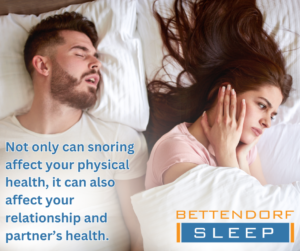Quality sleep is the cornerstone of physical and mental well-being, but for individuals grappling with sleep apnea, its effects often extend beyond the individual to impact their closest relationships. Sleep Apnea can significantly influence both the affected person and their partner, fostering an intricate web of challenges that demand understanding and support.

The first and most direct impact is on the affected individual. Sleep apnea can lead to chronic fatigue, daytime sleepiness, and irritability, affecting one’s mood and overall demeanor. As a result, the person with sleep apnea may find it challenging to engage fully in social interactions, including those with their romantic partner. The strain on personal energy levels and emotional well-being can create a ripple effect, causing friction and communication challenges within the relationship.
Beyond the individual’s experience, sleep apnea also directly influences the sleep quality of their partner. The loud and persistent snoring, abrupt awakenings, and periods of silence during breathing can disrupt the partner’s sleep, leading to a cycle of sleep deprivation that affects their own health. Moreover, the impact of sleep apnea on intimacy cannot be overlooked. Fatigue and irritability stemming from disrupted sleep patterns can reduce the desire for physical closeness and intimacy. As the affected individual battles with sleep-related challenges, the partner may also face emotional strain, feeling a sense of helplessness and concern for their loved one’s well-being.
Navigating these challenges requires open communication, empathy, and a proactive approach to seeking solutions. Encouraging the affected partner to undergo a sleep study and receive a proper diagnosis is a crucial first step. Treatment options, including oral appliance therapy or lifestyle adjustments, can significantly improve sleep quality and alleviate the strain on relationships. According to a 2023 study on OSA treatment and sleep on relationships found that 72.4% of couples began to sleep together after treatment. Couples facing sleep apnea challenges together can benefit from seeking support, both from healthcare professionals and each other. Understanding the condition and its impact on both partners fosters a supportive environment, encouraging collaborative efforts to address the challenges head-on.
In conclusion, sleep apnea is more than a personal health concern—it’s a shared journey that can influence the dynamics of romantic relationships. By acknowledging the effects on both the individual with sleep apnea and their partner, couples can work together to find effective solutions, ultimately promoting better sleep, improved well-being, and stronger connections.

